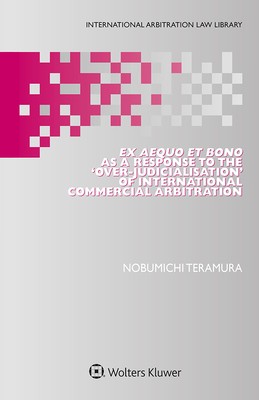
- Išsiųsime per 12–18 d.d.
- Autorius: Nobumichi Teramura
- Leidėjas: Kluwer Law International
- ISBN-10: 9403520736
- ISBN-13: 9789403520735
- Formatas: 16 x 24.9 x 2 cm, kieti viršeliai
- Kalba: Anglų
- Extra -15 % nuolaida šiai knygai su kodu: ENG15
Ex Aequo et Bono as a Response to the 'Over-Judicialisation' of International Commercial Arbitration (el. knyga) (skaityta knyga) | knygos.lt
Atsiliepimai
Aprašymas
Despite its many distinguished proponents over time, ex aequo et bono - the idea of deciding disputes on the basis of what an adjudicator regards as fair and equitable - has failed to take hold in international commercial arbitration (ICA). Formalisation and fossilisation of arbitral procedure, as manifested in the increasing use of litigation-style practice, unfortunately reign instead. This bold and challenging book argues that parties to an arbitration should be more willing for their cross-border disputes to be decided (and arbitrators should be more prepared to decide those disputes) in accordance with broad principles of equity and fairness, rather than by strict adherence to technical rules of law.
Putting forward suggestions based on extensive research and doctrinal considerations, this book invites us to confront what ICA was supposed to be, what it now is and what it can be. In particular, Dr Teramura discusses how, by resorting to ex aequo et bono, arbitrators can:
- construe contractual terms, including the limits;
- apply trade usages;
- deal with mandatory rules of a given forum or place of performance;
- minimise the cost and length of time that arbitration takes;
- avoid the abuse of discretion; and
- ensure predictable results.
The book examines significant differences in the way that ex aequo et bono arbitration is understood among various state and international institutions. It attempts to identify a 'common core' of universally accepted concepts underlying those different understandings. The book argues that ex aequo et bono has the potential to reform ICA without undermining its positive aspects. Along the way, it discusses the implications of ex aequo et bono arbitration on the now widely used UNCITRAL Model Law on ICA. It should thus appeal to lay business persons and commercial law practitioners who are looking for an economical and efficient way to solve business disputes within a globalised arbitration framework.
EXTRA 15 % nuolaida su kodu: ENG15
Akcija baigiasi už 2d.10:32:10
Nuolaidos kodas galioja perkant nuo 10 €. Nuolaidos nesumuojamos.

- Autorius: Nobumichi Teramura
- Leidėjas: Kluwer Law International
- ISBN-10: 9403520736
- ISBN-13: 9789403520735
- Formatas: 16 x 24.9 x 2 cm, kieti viršeliai
- Kalba: Anglų Anglų
Despite its many distinguished proponents over time, ex aequo et bono - the idea of deciding disputes on the basis of what an adjudicator regards as fair and equitable - has failed to take hold in international commercial arbitration (ICA). Formalisation and fossilisation of arbitral procedure, as manifested in the increasing use of litigation-style practice, unfortunately reign instead. This bold and challenging book argues that parties to an arbitration should be more willing for their cross-border disputes to be decided (and arbitrators should be more prepared to decide those disputes) in accordance with broad principles of equity and fairness, rather than by strict adherence to technical rules of law.
Putting forward suggestions based on extensive research and doctrinal considerations, this book invites us to confront what ICA was supposed to be, what it now is and what it can be. In particular, Dr Teramura discusses how, by resorting to ex aequo et bono, arbitrators can:
- construe contractual terms, including the limits;
- apply trade usages;
- deal with mandatory rules of a given forum or place of performance;
- minimise the cost and length of time that arbitration takes;
- avoid the abuse of discretion; and
- ensure predictable results.
The book examines significant differences in the way that ex aequo et bono arbitration is understood among various state and international institutions. It attempts to identify a 'common core' of universally accepted concepts underlying those different understandings. The book argues that ex aequo et bono has the potential to reform ICA without undermining its positive aspects. Along the way, it discusses the implications of ex aequo et bono arbitration on the now widely used UNCITRAL Model Law on ICA. It should thus appeal to lay business persons and commercial law practitioners who are looking for an economical and efficient way to solve business disputes within a globalised arbitration framework.


Atsiliepimai